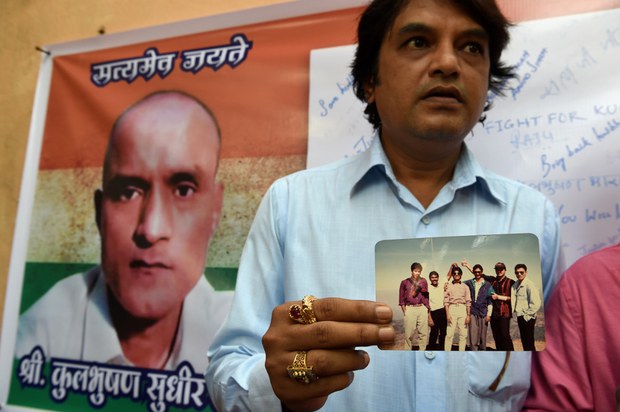World Court Stays Pakistan’s Execution of Indian in Spy Case
2017.05.18
New Delhi
 A friend of Kulbhushan Sudhir Jadav (shown on banner to left), an Indian national sentenced to death in Pakistan on espionage charges, holds up a photograph of a group with him in the Mumbai neighborhood where he grew up, May 18, 2017.
A friend of Kulbhushan Sudhir Jadav (shown on banner to left), an Indian national sentenced to death in Pakistan on espionage charges, holds up a photograph of a group with him in the Mumbai neighborhood where he grew up, May 18, 2017.
The U.N.’s International Court of Justice (ICJ) on Thursday ordered Pakistan to halt the execution of a former Indian naval officer, who was sentenced to death on espionage charges, until the bench delivered its final verdict.
But Pakistani officials responded by saying that the government would not obey the order from the court in The Hague in the case of the condemned man, Mumbai resident Kulbhushan Sudhir Jadav.
He was arrested in Pakistan’s Baluchistan province on March 3, 2016, and last month was sentenced to death after a military court convicted him on charges of spying for Indian security agencies.
“Pakistan shall take all measures at its disposal to ensure that Jadhav was not executed pending the final decision in these proceedings,” the ICJ said, while ordering Pakistan to “inform the court of all the measures taken in implementation of the present order.”
The order is binding on Pakistan, which is a signatory to the Vienna Convention, the 11-judge bench said, adding that the ICJ exercised compulsory jurisdiction on parties to the international treaty signed in 1961.
India brought the case to the world court on May 8, seeking an urgent hearing. It accused the Pakistani government of egregious violations of the Vienna Convention by wrongfully sentencing Jadhav to death after detaining and trying him in a military court in Pakistan.
India further alleged that it was not informed of Jadhav’s detention in Pakistan until long after his arrest and that Pakistan denied India its right of consular access to Jadhav.
Islamabad had informed New Delhi of Jadhav’s arrest in January as it requested India’s assistance in investigating Jadhav’s alleged involvement in espionage and terrorist activities in Pakistan.
“It [the ICJ] considers that the mere fact that Mr. Jadhav is under a death sentence and might therefore be executed is sufficient to demonstrate the existence of a risk of irreparable prejudice to the rights claims by India,” the bench said.
“Pakistan has indicated that any execution of Mr. Jadhav would probably not take place before the month of August 2017. This means that there is a risk that an execution could take place at any moment thereafter, before the court has given its final decision in the case,” it added.
Pakistan rejects ruling
Pakistan, however, in announcing Thursday that it would not abide by the U.N. court’s order, said the ICJ did not have jurisdiction.
“We do not accept the jurisdiction of the ICJ in matters related to the national security of the country,” Nafees Zakaria, Pakistan’s Foreign Office spokesman, told reporters there.
“The provisional measures are a procedural process only to enable the court to have full consideration at a later hearing. These measures have no bearing whatsoever on the final decision of the court. India has no substance in the case,” the office of Pakistan’s Attorney General said in a statement.
The two countries, which have fought three wars since the partition of the Indian-sub continent in 1947, are facing off in the international court amid rising tensions over the alleged beheadings of two Indian soldiers by Pakistani troops along the border in the disputed region of Kashmir earlier this month. The Pakistan Army denies this charge.
Jubilation in India
Soon after Thursday’s ruling in the Netherlands, Jadhav’s Mumbai neighborhood erupted in celebrations.
“The prayers of 125 crore [1.25 billion] Indians have been answered. We thank the ICJ for delivering such a welcome ruling,” Tulshidas Pawar, Jadhav’s childhood friend, told the Press Trust of India.
India’s External Affairs Minister Suchma Swaraj also hailed the ruling.
“The ICJ order has come as a great relief to the family of Kulbhushan Jadhav and people of India. … I assure the nation that under the leadership of Prime Minister [Narendra] Modi we will leave no stone unturned to save #Kulbhushan Jadhav,” Swaraj said on Twitter.
Even as foreign policy analysts dubbed the ICJ order a “diplomatic victory” for India, legal experts warned against celebrating too soon.
“The considerations of an interim order are different from a final one. Nobody has argues the evidence for the final case and the court has also not yet considered the evidence. The evidence has not even been prepared for the final hearing,” P.S. Narsimha, India’s additional solicitor general, told BenarNews.
“The ICJ’s order on Thursday should only be seen as an interim one and nothing more,” he added.
Other experts disagreed.
“It is certainly an interim order, but it has far-reaching consequences as far as violation of human rights by Pakistan is concerned, as it is much highlighted. Pakistan can’t act unilaterally now,” New Delhi’s based foreign policy analyst Vinay Kaura told BenarNews.
“India, of course, has some advantage over Pakistan after today’s ruling,” Kaura said.







